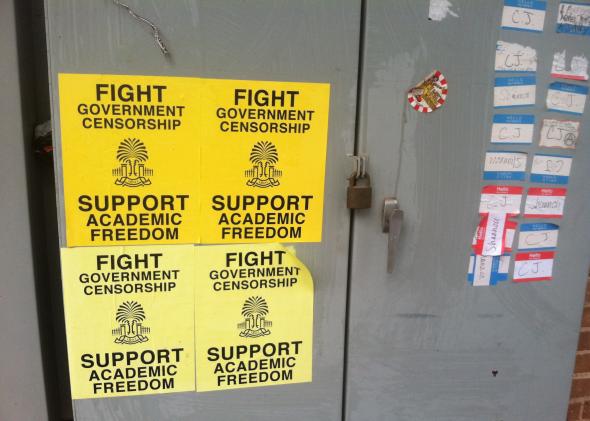This is why I moved away from South Carolina! Ignorant rednecks! Just another example of South Carolina moving backward!
When the University of South Carolina Upstate’s Center for Women’s and Gender Studies was closed last week—on the heels of longer controversy surrounding the assignment of LGBTQ-themed books at that school and the College of Charleston and subsequent saber-rattling by the conservative state legislature—these were the kind of sentiments expressed by the state’s more progressive residents and onlookers. And understandably so: If South Carolina already has a reputation nationally for being “backward,” the closing of a center like this one does send up the red flag of regression.
It would be easy to just slip this closure into our overstuffed “backwards” file and walk away, advising queer people and progressives to do the same. Believe me, as a South Carolina native, LGBTQ activist, and avid gender studies supporter, I get the visceral appeal of that option. But as a scholar of conflict resolution, I know finding a way forward through the polarization is more important in the long run. If you know anything about conflict, you know it’s never as transparent as you wish it would be—each one is wrought with complexities that speak to each party’s positions, interests, and needs. It’s how we attend to all those elements that determine whether we do something more useful with our hands than simply washing them of the situation.
Let’s start here by reviewing the facts. The announcement of the closure came earlier this month following a series of events in the South Carolina legislature relating to funding cuts aimed at both USC Upstate and College of Charleston as punishment for introducing books with gay themes into the schools’ first year reading programs. Administrators at USC Upstate claim that terminating the Center is a part of a larger budget trimming effort; closing the Center for Women’s and Gender Studies will reportedly save USC Upstate $45,000.
You could, of course, question this timing. The satirically titled performance “How to Become a Lesbian in 10 Days or Less” was set to be an entertainment piece during USC Upstate’s annual “Bodies of Knowledge Symposium”—an event hosted by the Center—in April. The performance by lesbian comedian Leigh Hendrix was canceled, however, due to complaints from state senators saying that the program represented “indoctrination.” Still, Dr. Tom Moore, the chancellor of Upstate, insisted that while the university had indeed been at the center of much furor regarding LGBTQ-related programming, the decision to close the center was ideologically pure.
So here’s our conflict: While Upstate’s administration stands by the line that the closing of the center was purely coincidental, the center’s supporters (LGBTQ activists and alumni among them) aren’t having it—they believe that shutting down the center is retribution for the continued controversy over LGBTQ politics. Unfortunately, I can’t offer a concrete answer to why the center was closed. But I can offer some ideas for moving the conversation forward.
First, we should take care not to personify the conflict. Chancellor Moore is not the villain and Lisa Johnson, director of the center, is not the victim. I asked what Johnson thought about Chancellor Moore: “I think he’s a leader that values women and LGBTQ people,” she said. “Unfortunately the decision to close the center doesn’t do that.” By recognizing the difference between the person and the action, Johnson is practicing nonviolent conflict resolution.
I’d also advise trying to detach the closing of the center from the other events surrounding LGBTQ legislation in South Carolina. Indeed, Johnson understands the center’s closing as a disenfranchisement of female faculty. While the LGBTQ angle is a little buzzier right now, she doesn’t want people to overlook that fact that this is the Center for Women’s and Gender Studies of which LGBTQ programming is but one aspect. She believes that by closing the center, Upstate is “systematically disempowering” women.
Another issue is the question of impact. Upstate seems to view the center as simply the housing for a noncrucial minor program, making the cut easier. But this ignores the myriad ways in which the center functions. While fewer than 20 students are enrolled in the gender studies minor, 332 took gender studies courses just last year. That view also ignores the work the center does with Gender Benders for the National Day of Silence and the connections with the community that have been created through programs like Girls on the Run.
When asked how she thought this conflict could be resolved, Johnson responded, “I can’t immediately see a resolution because we’re still putting together what the problem is.” It seems that the dynamics are as such that maybe there can’t be a productive conversation just yet—and that’s OK. In the conflict resolution field, we say that means the conflict isn’t “ripe” enough; a conflict must usually develop to a certain extent before negotiation is possible. In this conflict that may mean that the administration at Upstate needs to take more time to understand the secondary effects of closing the center. Or maybe it means those who oppose the closure should take time to show administration that for many, the center is simply not expendable.
Undoubtedly, South Carolina has quite a way to go in the realm of LGBTQ rights and gender equality. Hell raising is needed. But while you’re raising hell, remember that with conflict comes a learning opportunity for everyone. If you approach a conflict with anger only, the chance of creating a win-win situation quickly diminishes. And if you abandon the conflict (i.e. advocate that everyone move out of South Carolina because it’s too “backwards”), nothing will be resolved. Let’s hope that USC Upstate and everyone else engaged in this conflict take the opportunity to turn it into something meaningful.
